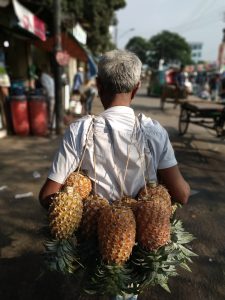Can text messaging improve dietary behaviour in people with type 2 diabetes?
August 27, 2021
Type 2 diabetes mellitus (T2DM) is one of the most prevalent non-communicable diseases worldwide and rates are expected to rise from 151 million in 2000 to 578 million in 2030. Low and middle-income countries are affected the most, and Bangladesh is in the top ten countries globally for diabetes.
Improving dietary and lifestyle behaviours are proven to enhance health outcomes. Generally, people with T2DM have a poor diet, are physically inactive and getting them to improve these behaviours is challenging. Research has shown that mobile phone health (mHealth) programs may improve lifestyle behaviours and health outcomes in people with T2DM. However, there isn’t a lot of data in mHealth focused on dietary behaviour change, especially in low- and middle-income countries. We conducted a randomised controlled trial to determine the effectiveness of a text messaging program on dietary behaviours in patients with T2DM.
What did we do?
There were 200 participants with T2DM included in Our study who were recruited from an outpatient clinic in Bangladesh. There were 106 who received a text messaging intervention for 6 month and 94 who continued with standard care. Those who received the text messages got a message once per day for the duration of the intervention. These messages were about medication compliance, health education about diabetes, its complications, diet, and physical activity. Twenty of the 90 messages were about diet. We assessed the participants dietary habits before the study and after 6 months. We collected data on weekly consumption of fruit, vegetables, sugar sweetened beverages and added sugar to tea and coffee. To assess improvements in blood glucose levels, we used a blood test measuring HbA1c.
What did we find?
Participants mean age was 48 years old and just over half were female. When they started the study, none of the participants met the World Health Organization’s guidelines for recommended vegetable and fruit intake. After 6 months, there was no improvement in vegetable and fruit consumption. Sugar sweetened beverages reduced in both groups and added sugar to tea and coffee reduced in the control group but not the text messaging group.
So, what does this all mean?
These participants with T2DM don’t meet the recommendations for vegetable and fruit intake and their dietary behaviour didn’t improve after this text messaging intervention. Why not? Well, diet was only one small part of this intervention which also focused on medication adherence, clinic attendance and physical activity. So, participants had a lot of things to think about and change. Dietary changes are complex and take time, and future studies should consider a dietary intervention designed by a dietitian tailored for people with T2DM with perhaps more of a diet focus. Furthermore, looking at diets was a secondary outcome after the study was conducted. Having more dietary data collection may have helped to paint a bigger picture about dietary patterns in this cohort.
What’s next?
Technology and text messaging has great potential as a low-cost way to support the large number of people with T2DM. We need more studies with tailored dietary interventions to determine if this is an effective way to make healthy dietary changes. Currently, we are developing personalised approaches to improve dietary behaviour and physical activity using digital health technologies.
Dr Shariful Islam (MBBS, MPH, PhD, FESC) is a physician trained in cardiology, epidemiology and digital health. Dr Islam is a National Heart Foundation Senior Research Fellow and NHMRC Emerging Leadership Fellow at the Institute for Physical Activity and Nutrition (IPAN), Deakin University. His research focuses on innovative technologies for health including use of mHealth, sensors, wearables and artificial intelligence for improving cardiovascular health and global health. Dr Islam is a member WHO Technical Advisory Group on Digital Health and leads the Cardiac Society of Australia and New Zealand position statement on Artificial Intelligence in Cardiology. Dr Islam has published >211 articles and ranked in Top 2% of scientists in General and Internal Medicine globally in 2019.
Dr Elena George is an Accredited Practising Dietitian, Lecturer in Nutrition and Dietetics and early career researcher at Deakin University. Elena is interested in translational research, in particular enhancing evidence-based practice in dietetics through research. Her interests are in development and delivery of dietary interventions (Mediterranean diet) for the prevention and management of chronic diseases (type 2 diabetes, non-alcoholic fatty liver disease, metabolic syndrome and cardiovascular disease). Elena has experience as a clinician running her own successful private practice and as a research dietitian in tertiary hospitals.
Click here for more information about Deakin IPAN’s research into physical activity and nutrition or follow us on Twitter @DeakinIPAN